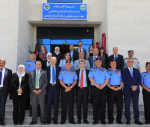You are here
A national body overseeing research in the humanities and social sciences
Dec 18,2021 - Last updated at Dec 18,2021
For decades our society, like many societies the world over, has been greatly interested in science and technology.
Such interest is justified, of course, as science and technology constitute, in the views of many, the backbone of societal development and progress.
Over thousands of years, but especially since the advent of the first industrial revolution in the 18th century, humanity has reaped so much as a result of scientific advances and inventions, making life a lot more convenient, human health a lot more robust, and the economies a lot stronger.
At this point in time, technology in specific plays a crucial role in our lives, and we have become extremely reliant on it, and will be so for years to come.
So many smart solutions to so many chronic problems, in fact, come from technology.
This is why countries are correct to prioritise focus on science and technology, and should continue to push for more creativity and more innovation based on scientific and technological advances.
But the humanities and social sciences, which sadly have either noticeably regressed or been greatly neglected in the past few decades, are also important to prioritise.
If science and technology are considered by many, as stated above, to be the “backbone”, the humanities and social science, one could argue, are considered the “heart” and the “brain”.
The humanities and social sciences, when given the right attention and focus, also contribute substantially to human development and progress.
As prefaced, science and technology provide ample solutions to many of our challenges and problems, but there are smart solutions to other problems and challenges that can only be brought about by the humanities and social sciences.
While much of human efficiency in life and in the workplace is reliant on skills that come from science and technology, much of it is determined by values, ethics and morals which are instilled in individuals through good upbringing and through exposure to education in which the humanities and social sciences are a primary component.
This type of education is often referred to as liberal arts.
A healthy, robust liberal arts education endows individuals exposed to it with many crucial skills extremely needed in the workplace especially under the 4th and the 5th industrial revolutions where technology is so prevalent, ones that cannot necessarily come from science and technology.
These skills include, but are not limited to: commitment, discipline, empathy, emotional intelligence and creativity.
And they also include communication skills, critical-thinking skills, cultural skills, character skills and many others.
The point to stress here, since the humanities and social sciences are so vital, is the necessity of reversing the process of their regression or decline, and then giving them enough attention, focus, and support to enable them to play the role they should be playing in our lives.
And one of the best ways of boosting interest in and support of the humanities and social sciences is to establish a national body, such as a council, centre, society, etc. that undertakes to initiate, supervise, and manage research in the fields of humanities and social sciences.
We know, of course, that there are several institutions or forums in the country, including universities and half a ministry, concerned with research. But often the notion of “scientific” research is more geared, even biased, towards research in the sciences and technology fields, at the expense of the humanities and social science.
What we need is a body exclusively concerned with research, preferably without the misnomer adjective “scientific”, in the humanities and social sciences fields, a body that helps in finding solutions to so many societal and civilisational ills at the national, regional, and international levels.
A step in this direction is long overdue, and someone out there is needed to champion the establishment of such a body













